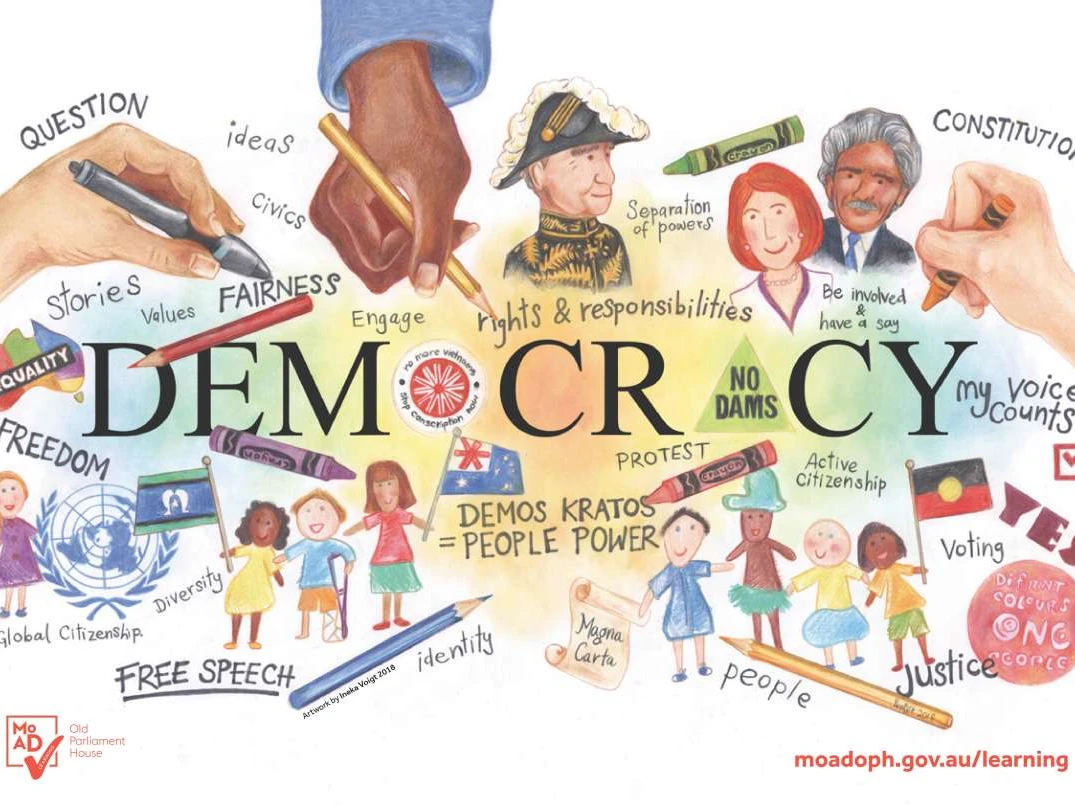Mudabicara.com_ Direct democracy is a part of a political system that gives full space to the people to participate in determining decisions and policies.
The system of direct democracy is certainly different from the system of representative democracy, but in practice many people have difficulty explaining the fundamental differences between what is direct democracy and what is representative democracy.
Now! In this article review, Mudabicara will explain about the direct democracy system. For those of you who are studying political science, consider thoroughly the following reviews:
Read Also : Democratic Political System, Definition, Types and Characteristics
Definition of Direct Democracy

Etymologically, the word democracy comes from two Greek words, namely demos and kratos. Demos means people and kratos means government.
Meanwhile, in terminology democracy is a form of government that prioritizes the interests of the people regardless of background.
On the other hand, democracy is a political system in which citizens have the right to vote and be elected and the right to nominate or be nominated.
In terms of direct democracy ( direct democracy ) is often referred to as pure democracy ( pure democracy ). Where supreme power rests in the hands of the people.
Abraham Lincoln defined democracy as a government of the people, by the people and for the people.
In the perspective of political participation , direct democracy is closely related to the procedures for how people carry out political participation in shaping public policy.
In addition to high political participation, direct democracy also provides space for citizens to hold deliberations and give equal rights to citizens in making decisions.
For example, when the government wants to issue a policy, citizens will give good views in the form of suggestions and criticism.
After this process, citizens also provide procedures for how the policy is issued and carried out and is binding.
As the basic principles of democracy, an open government and provide the widest possible space for the public to participate in making policies and decisions.
In the end, direct democracy can also be interpreted as a system of government that gives place to the people fully and directly in making choices.
Although not all countries or regions are suitable for implementing a direct democracy system because there are several factors that are sometimes not suitable for implementing a direct democratic system.
Plus the important note that direct democracy and indirect democracy is the division of democracy based on channeling the will of the people.
Read Also : Definition of Government System, Types and Examples
This means that the distribution of the people’s will is related to the area, population and how big the problem will be.
Characteristics of Direct Democracy
1 . Small Territory
Direct democracy is more suitable for countries with small territories because with a small area it will make it easier for the people and the government to coordinate and communicate quickly and maximally.
Basically, direct democracy can run optimally when the interests are still small, the problems are not complex, and the citizens are still counted in a measurable number.
Read Also : Political System, Understanding and Various Kinds
In historical records, direct democracy was once a way of channeling the will of the people’s choice during the ancient Greek government by forming city-states such as Sparta and Athens.
2. No Representative Or Legislative Institutions
In a direct democracy, citizens do not have a legislature or representative assembly to voice their opinions and criticize the government.
Because in a direct democracy every person or group can voice their opinions and criticisms directly and openly both individually and as group representatives.
This is certainly different from indirect democracy where people elect their representatives to be able to sit in parliament or the legislature. It is the task and function of the legislature that will convey the aspirations of the people from below.
Besides that, in an indirect democracy, political participation is only seen from their participation in the election or election process. So that political life in society tends to be passive in the process of daily activities.
3. Policies Based on the Voice of the People
In a direct democracy, policies and decisions originate from the voices of the majority of the people, whether in the form of government policies, laws or other social issues.
In contrast to indirect democracy where citizens cannot directly voice their opinions. In making policies the people have to go through a representative system.
People who become representatives of the people are the results of direct elections carried out by the people in the election arena.
4. Sometimes It’s Difficult to Reach Consensus
Openness and freedom in direct democracy on the one hand are advantages but on the other hand are also disadvantages.
For example, there are differences of opinion in making policies and decisions, so the direct democratic system does not have a clear mechanism for how to resolve it.
Read Also : Monarchy Government System, Definition, Types and Characteristics
This is certainly very risky and prone to conflict between communities and groups. As a result, policies and decisions have come down to reach agreement.
5. Identical to Local Political Issues
In the practice of direct democracy, usually the political issues that form the basis of the struggle are local issues. This means that local issues certainly do not involve many communities and groups.
Even though local issues are also a problem, local issues tend to be easier to solve so using direct democracy is the right choice.
6. Fighting for Specific Political Issues
In this democratic system, political interests are usually based on groups, factions and communities. Not infrequently these interests involve social identity, social class and even public positions such as politicians and bureaucrats.
These specific political issues can also be in terms of fighting for the interests of economic resources in one area, fighting for recognition of regional culture, or fighting for recognition from one region to another.
7. Small Political Society
The direction of direct democracy is to build a paradigm of political society. The political community does not have to be in large numbers, but it is better if a political community is born on a small scale.
This means that in the flow process civil society will have the same socio-political capital in channeling their political aspirations.
In contrast to indirect democracy whose participation is calculated by nominal figures so that their political participation is only at the moment of the election.
In daily activities, they tend to be passive and indifferent to political phenomena because of the narrative of representation in parliament and the legislature.
9. Prone to Conflict
When many interests arise, this democratic system does not have sufficient mechanisms on how to mitigate them.
Read Also : Liberal Democratic Political System, Definition, Types and Characteristics
So that when there are differences of opinion with each other and it ends in misunderstanding, then democracy has no way out except voting.
This conflict-prone tendency makes this democratic system unsuitable for implementation in areas with complex problems, heterogeneous populations and large areas.
This is an explanation of the direct democratic political system this time, I hope it will be an interesting and inspiring reading of political science. Happy reading!

